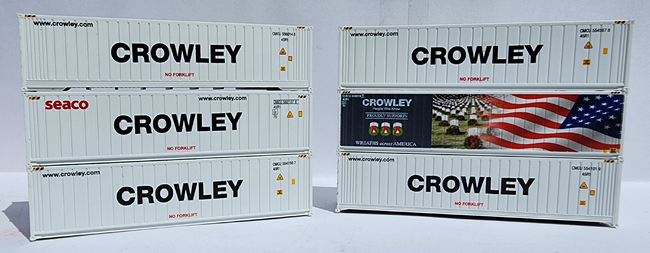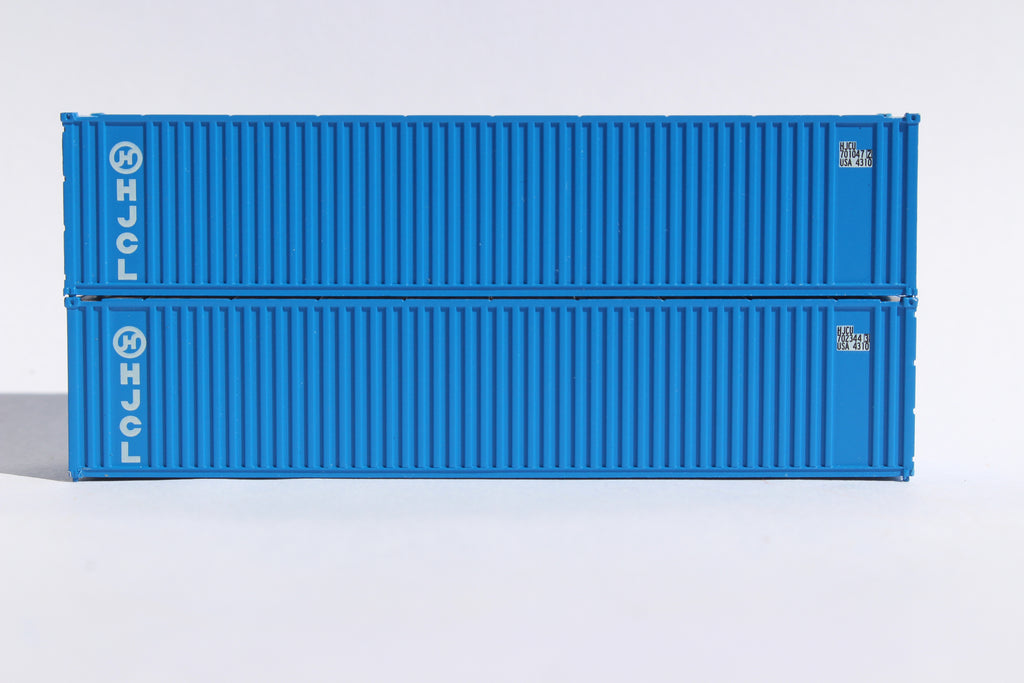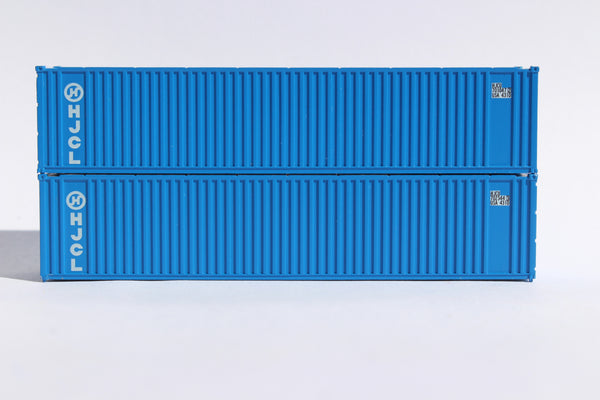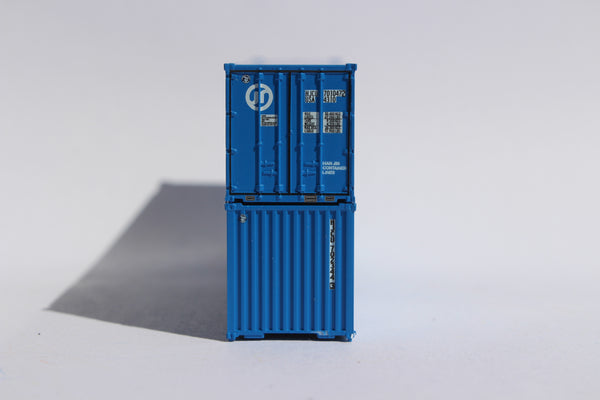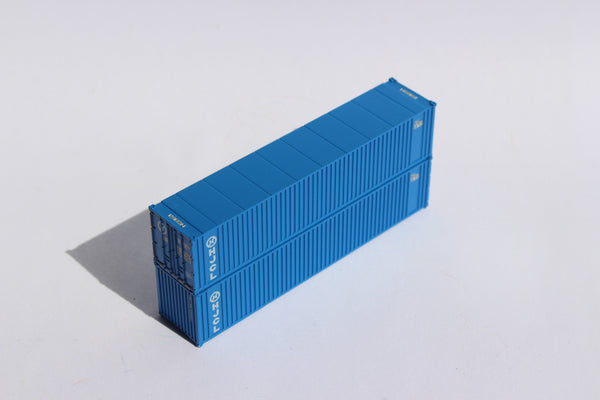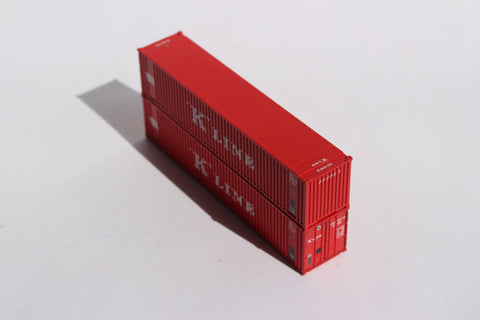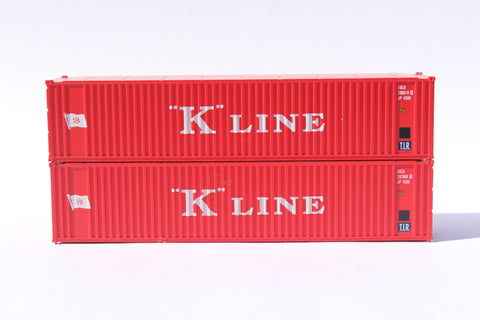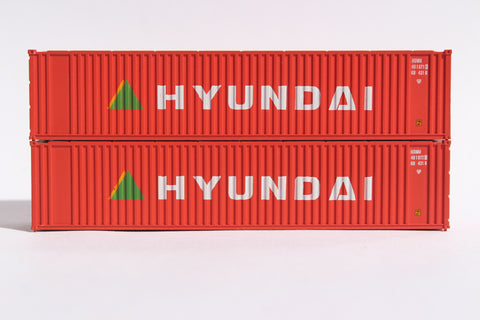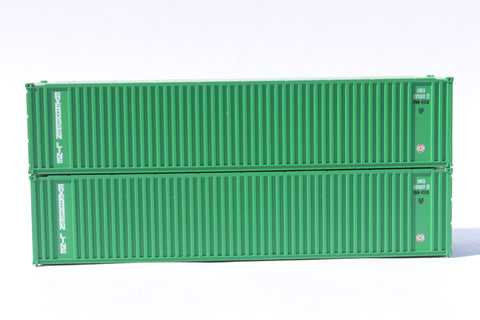HANJIN (early) 40' Std. Height 2-P-44-P-2 'Square Corrugated' side containers JTC # 405555
405555 HJCU HANJIN (early scheme) 40' Std. Height 2-P-44-P-2 'Square Corrugated' side containers.
This is another New Body Style available November 2020. It features square corrugations in a 2-44-2 Side arrangement. From the end -2 corrugations, then flat panel, then 44 corrugations, then flat panel, then 2 corrugations. Body style # 40RPS(2).
This body style also features three roof styles as per prototype photos. Some have the 'ribbed' style roof, and others have the 'flat panel' style roof, and others have a 'smooth' style roof. More prototypical variations from JTC Models. 12 different door styles are available in the Standard Height Series, and 5 different Front styles.
Hanjin Shipping Co., Ltd. was a South Korean integrated logistics and container transport company. Prior to its financial demise, Hanjin Shipping was South Korea's largest container line and one of the world's top ten container carriers in terms of capacity.
Hanjin started at the end of World War II, in November 1945. Early on, its biggest customer was the U.S. Army, providing the transportation of material to both Korea and Vietnam. The company signed a major contract with the US 8th Army in November 1956, and another contract in March 1966, with all of the U.S. armed forces in Vietnam, including the Army, Navy, and Air Force. In November 1969, Hanjin made its entry into the containerized shipping business signing a deal with Sea-Land Service, Inc. In September 1970, the company opened its first container yard at the port of Busan.
During the 70s and 80s Hanjin pushed growth in the Middle east area. In March 1990, Hanjin branched out into trucking and warehousing with the purchase of Korea Freight Transport Company. In June 1992, Hanjin Express was introduced to deliver small packages and provide courier service. The company started to load and unload cargo at the ports of Long Beach and Seattle with the joint venture Total Terminals International LLC., in August 1992.
In January 1993, they initiated container rail service between Pusan and Uiang. In May 1995, Hanjin hauled grain to North Korea.
In 1997, DSR Senator(German) was in financial difficulties, after which the South Korean shipping company Hanjin Shipping, already holding the majority share (80%) of the Senator Line took over. In the year 2000 the name change to Senator Lines
Hanjin-Senator was achieved by combining the container fleets of Hanjin Shipping and Senator Lines, making Hanjin-Senator the eighth largest container shipping company in the world. Hanjin was Senator's majority shareholder; the two companies were run separately but combined their fleet numbers for statistical purposes.
The German subsidiary carrier Senator Lines announced on February 4 2009 that they would be ceasing operations due to the economic downturn
On August 31, 2016, Hanjin Shipping filed for bankruptcy. Hanjin Shipping's creditors withdrew their support after deeming a funding plan by parent company Hanjin inadequate.
Aftermath and legacy;
Hanjin Shipping's dissolution was the largest and most significant bankruptcy in the container transport industry and it caused worldwide supply chain and shipping disruption as cargo ships were left stuck at ports and canals waiting for cash payments. Hanjin's bankruptcy created a massive ripple effect. Other businesses that rely on physical products found themselves without the expected revenue from inventory that became stuck at sea. Hanjin's abrupt cave-in occurred at an especially inconvenient time for retailers furnishing their inventories with imported items in preparation for a seasonal uptick in Thanksgiving, Christmas, Black Friday, and New Year's sales. Although large companies such as Nike were affected, the repercussions were more prominent on smaller companies.
In February 2017, SM Line, a new shipping firm formed by Samra Midas (SM) Group, purchased five vessels previously owned by Hanjin. In March, SM Line acquired two of Hanjin Shipping′s terminals in Korea, in the cities of Gwangyang and Incheon.
In August 2017; a South Korean bankruptcy trustee which was appointed to manage the liquidation of Hanjin Shipping, reported that it had only collected 220 million USD from the sale of Hanjin's assets. This sum amounts to only 2% of the 10.5 billion USD total debt Hanjin owes to its creditors.
